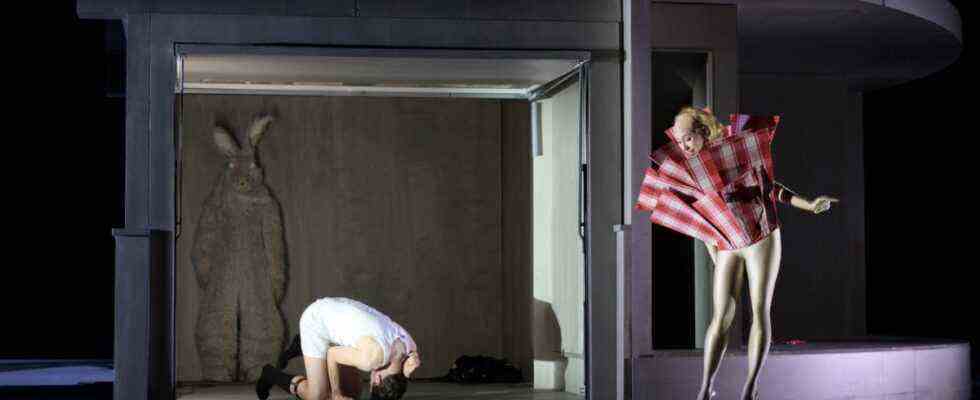Marriages can quickly become routine, with unforeseeable consequences for those involved. The composer Arnold Schönberg knew this at the latest after his own difficult first marriage. Among other things, he worked it into the one-act play “From Today to Tomorrow”, for which his second wife Gertrud wrote the libretto under a male pseudonym. A man underestimates his wife precisely because she is loyal to him and lovingly takes care of their child. In revenge, she plays him the type of woman who might be more erotically appealing to him, but hardly likely to appeal to him for long-term cohabitation: careless, moody, extravagant, unfaithful. In the end, the game works out, even if both just slip past the catastrophe.
Aesthetically, Schönberg’s work, which lasts almost an hour, is an attempt to combine the lightness of musical comedy with the strictest twelve-tone technique. When it was premiered at the Frankfurt Opera in 1930, it met with mixed audience reactions. In the present, director David Hermann approaches the play at the same house, which is still known for its innovative music theater program, by continuing the story and turning it into the tragic.
The stage designer Jo Schramm placed an exemplary single-family house from the suburbs of the world on the revolving stage. It will soon crumble into fragments along with the community of its inhabitants. The couple has hardly been reconciled when the purely orchestral “music to accompany a movie scene” joins the production, which Schönberg composed for an imaginary film: The silent routine, visible in the morning school walk with the child, continues until the marriage breaks up and the woman leaves the man.
He dies in the trash of the lunch boxes, she suffers again what separated her from him
In the second part of the Frankfurt evening you can experience what, in the worst case, is in store for both sides: a pretty lonely old age. He dies in the garbage from the food boxes that are delivered to him by a young nurse. And faced with the corpse, she suffers once again what separated her from this man, but above all connected her to him. The sounds for this are provided by two existential pieces of solitude music from the first half of the 20th century: for him the six monologues that Frank Martin composed after Hugo von Hofmannsthal’s “Jedermann”; for them Schönberg’s “Erwartung” from 1909.
The baritone Johannes Martin Kränzle lends Martin’s lament enormous poignancy, using expressive interpretation of the text to fathom the entire spectrum between fear and the longing for death, rebellion and surrender to fate. No less impressive is the soprano Camilla Nylund, who never gets under pressure in view of the dramatic demands of Schönberg’s monodrama, but rather traces the emotional swings with a rich, softly sung color palette. This is also made possible by the conductor Alexander Soddy, who with the Frankfurt Opera and Museum Orchestra does not emphasize the expressionist excesses, but rather gently, often almost tenderly, listens to the impressionist instrumentation from Schönberg’s early, freely atonal phase.
Soprano Camilla Nylund as Eine Frau.
(Photo: Barbara Aumüller)
Soddy also brings lightness to “From Today to Tomorrow”, keeps the tempi supple and evokes dance-like impulses. But in the austere, albeit masterfully crafted, twelve-tone polyphony, the instrumental lines thicken to such an extent that they sometimes beset the singers. This is probably one of the reasons why Sebastian Geyer, who sings intelligibly to the text, as a younger man, and Elizabeth Sutphen’s robust, high-pitched soprano as a young woman, fall behind the older couple.
“Waiting for today” is what director Hermann called his conceptually well thought-out modern pastiche. And thus provides a prime example of how one-act plays that are too short for an evening at the opera can also be combined in other ways than simply with another one-act play. But for the implementation, he unfortunately comes up with far less – or rather strange. In any case, “From today to tomorrow” ends in a horror film quote in which two zombies attack the young couple.
On the other hand, Hermann works in the second part with a realism that does neither the transcendent dimension of the “Jedermann” monologues nor the existentialist surrealism of Schönberg’s “Erwartung” any good. Unfortunately, he also misses the obvious opportunity to have both couples meet each other on stage and thus become real mirror figures. So these scenes of a marriage ultimately remain a series of numbers that, musically brilliantly implemented, do not become a theatrical whole.

